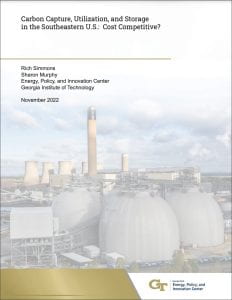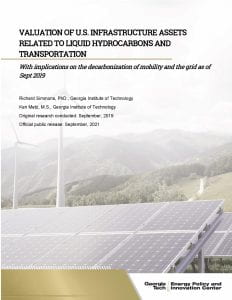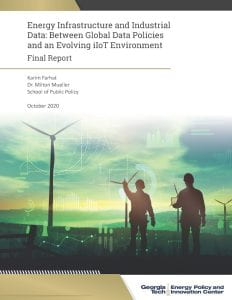A principle objective of the Energy, Policy, and Innovation Center (EPICenter) is to produce, disseminate, and amplify rigorous, fact-based policy studies that address Southeastern perspectives on global, national, and regional energy issues. EPICenter research studies involve interdisciplinary research teams led by Georgia Tech faculty and engage external stakeholders and advisors.
● More energy related publications are available at Georgia Tech’s Strategic Energy Institute website.

Carbon Capture, Utilization, and Storage in the Southeastern U.S.: Cost Competitive?
Researchers: Richard Simmons and Sharon Murphy
This report summarizes existing asset values and investments for U.S. infrastructure related to liquid hydrocarbon transportation systems. This includes primarily assets in the hydrocarbon fuel supply chain as well as the engines and equipment that consume hydrocarbon fuels. The motivation prompting this effort is generally stated as a desire to better understand near-, medium-, and long-term pathways to decarbonize transportation. As such, this particular effort was a part of a broader scoping effort in which researchers with Georgia Tech’s Strategic Energy Institute sought to compare the economic viability of renewable hydrocarbons as a substitute for petroleum-derived fuels. This includes both biofuels and synthetically produced alternative fuels. Doing so is believed to help facilitate a more direct and holistic comparison of renewable fuels with other forms of sustainable transportation, such as electric vehicles (EVs).
Energy 101 Short Form Video Series
Researchers: Richard Simmons (PI), John Thornton, Mark Philpot
The Energy 101 SE video series provides high level as well as regional perspectives on energy systems, resources, economics, policy, and technology fundamentals for a general audience from ages 14 to 114. It builds upon a previous and comprehensive Energy 101 MOOC developed by Georgia Tech’s Strategic Energy Institute and originally launched in 2012. Nearly 100,000 learners accessed that course over the past decade.
Visit the Energy 101 Page
Valuation of US Infrastructure Assets Related to Liquid Hydrocarbons and Transportation:
With Implications on the Decarbonization of Mobility and the Grid as of Sept. 2019
Researchers: Richard Simmons and Keri Metz
This report summarizes existing asset values and investments for U.S. infrastructure related to liquid hydrocarbon transportation systems. This includes primarily assets in the hydrocarbon fuel supply chain as well as the engines and equipment that consume hydrocarbon fuels. The motivation prompting this effort is generally stated as a desire to better understand near-, medium-, and long-term pathways to decarbonize transportation. As such, this particular effort was a part of a broader scoping effort in which researchers with Georgia Tech’s Strategic Energy Institute sought to compare the economic viability of renewable hydrocarbons as a substitute for petroleum-derived fuels. This includes both biofuels and synthetically produced alternative fuels. Doing so is believed to help facilitate a more direct and holistic comparison of renewable fuels with other forms of sustainable transportation, such as electric vehicles (EVs).
Industrial Data and Industrial Internet of Things
Researchers: Milton Mueller (PI), Karim Farhat
Industrial data (ID) has the potential to play a key role in finding efficiencies in energy markets and thus lower rates for consumers. This study explores strategies for the energy sector with respect to ID production and sharing in the Southeastern U.S. region. It focuses on the sources and uses of ID, and the evolution of energy firms within the ID ecosystem. The goal of this work is to provide energy executives and policy makers with recommendations that will help maximize the usability and production of industrial data in the Southeastern U.S. energy context.
Assessment of Grid-Scale Energy Storage Scenarios for the Southeast: Benefits, Costs, and Implications
Researchers: Santiago Grijalva (PI), Richard Simmons (co-PI), Sadegh Vejdan
An evaluation of the role that grid-scale storage technologies will play in the coming decade. The study addresses key gaps given the regulatory model and the lack of market signals for the benefits and services of energy storage systems (ESS) in the Southeast region. The report quantifies the economic viability for a range of ownership and operation scenarios including: behind the meter (BTM), utility owned/operated, and uniquely, joint models for customer-sited/utility operated batteries.
Georgia’s Model Solar Ordinance
Representatives from Emory Law School, Georgia Institute of Technology, and University of Georgia came together to develop a model solar zoning ordinance for Georgia counties and cities to utilize as a template in amending their zoning codes. The Georgia Model Solar Zoning Ordinance (Georgia Model Solar Ordinance or Model Ordinance) is a comprehensive solar land use ordinance based on best practices learned nationwide and shaped to fit Georgia’s specific needs. It is meant to be an example—a place for counties and cities to look when deciding how best to regulate the siting of solar energy systems in their communities.
PREVIOUSLY COMPLETED RESEARCH STUDIES
Kemper Technical Review
As a first-of-its-kind project, the Kemper Integrated Gasification Combined-Cycle (IGCC) Plant with Carbon Sequestration and Storage (CCS) is an important and timely case study for the technical community. The findings detailed in the report have considerable value to a range of stakeholders, including the research community and energy policy decisionmakers.
Industrial Data
An analysis of how the digitalization of industries and industrial data is evolving into a business itself, capable of producing services and opportunities across organizations and economies. To illustrate this, the EPICenter has produced an Industrial Study One Page Overview as well as a more detailed study, Industrial Data and Regional Economic Development, with the Georgia Tech Center for Urban Innovation. Additional data and details are available in the presentation, Industrial Data and Regional Economic Development: An Emerging Industry Nexus. The findings of this study were also presented in a joint event with the Center for Strategic & International Studies (CSIS) and Siemens, “Digitalization in the Industrial Sector: Implications for Energy, Technology, and Policy”.
The Energy Burden in the Southeast: Solutions through Community and Business Engagement
Researchers: Michael Oxman (PI), Marilyn Brown, Beril Toktay
An analysis of the current and potential methods for reducing the energy burden in the Southeast and the business case for each strategy, producing actionable recommendations for policy and technological solutions.
Grid Integrated Vehicles in the Southeast: Engineering, Business Models, Costs, and Benefits
Researchers: Marilyn Brown (PI), Deepakraj Divan
An evaluation of the alternative mechanisms for expanding the deployment of EVs in the Southeast through improvements in technology, infrastructure, and novel business models. The findings and final paper can be found here.
Smart Cities and the Role of Data Transparency in Evidence-based Energy Policies at the Urban Scale
Researchers: Jennifer Clark (PI), Debra Lam, Emma French
Interdisciplinary and cross-sector research of the processes behind and approaches to data-driven policies, resulting in the identification of data that is used for energy efficiency policies across cities in the Southeast. The findings and final paper can be found here.

